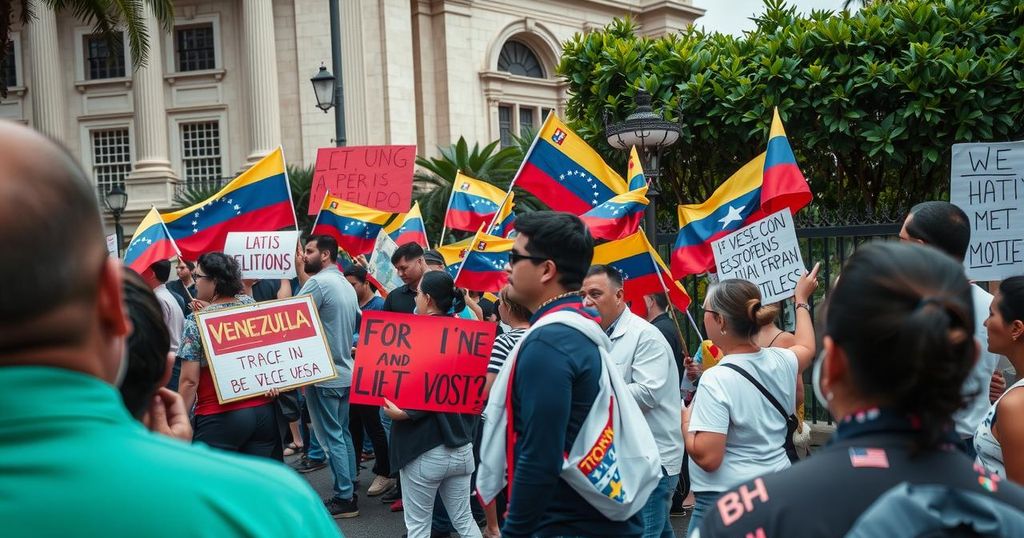Venezuelan Opposition Criticizes Police Presence at Embassy Amid Tensions

Six Venezuelan opposition figures at the Argentine embassy in Caracas decried harassment by local police, prompting the U.S. and Argentina to condemn the actions as violations of international law. The incident follows recent calls for mobilization by opposition leader María Corina Machado, amidst ongoing political repression in Venezuela. Diplomatic relations have been strained since 2019, illustrating the broader tensions in the region regarding human rights and asylum.
In Caracas, six Venezuelan government opponents residing at the Argentine embassy publicly condemned the presence of local police and intelligence agents stationed outside the facility for several hours. This incident has elicited serious rebuke from the U.S. government, which characterized it as a flagrant violation of international law, while Argentina’s Foreign Ministry described the situation as harassment. Most of these opponents are affiliated with the Vente Venezuela party, led by former legislator María Corina Machado, who confirmed that a new siege by masked officials began late Saturday night and continued into Sunday.
The timing of this event is significant as it came just hours after Machado called for widespread mobilization on December 1, leading Venezuela’s Minister of the Interior to accuse her of conspiring against the government of President Nicolás Maduro. The Vente Venezuela party asserted that the embassy remains without electricity and is encircled by regime vehicles impeding the flow of traffic in the vicinity, additionally claiming that communication signals were being scrambled.
Argentina’s Foreign Ministry described the deployment of armed personnel and street closures as a significant disturbance to security, urging the international community to denounce these actions, a call echoed by the U.S. The U.S. Embassy in Venezuela condemned the harassment against asylum-seekers, highlighting that the presence of armed forces and the imposition of blockades constituted serious violations of international law. Furthermore, it demanded that the Venezuelan regime honor its international obligations and ensure the safe passage of asylum-seekers.
The diplomatic relations between Venezuela and Argentina had been strained since 2019. Opposition members of Vente Venezuela entered the embassy in March after the Venezuelan Attorney General’s Office issued arrest warrants against them, accusing them of inciting violence to unseat the government. In August, Brazil was requested to provide security for the Argentine embassy following Venezuela’s decision to expel Argentine diplomatic personnel. However, in September, Venezuela revoked Brazil’s authorization to guard the embassy, alleging misuse of the premises for alleged terrorist conspiracy, claims which Brazil and Argentina have firmly rejected.
The political climate in Venezuela remains volatile, with significant tensions between the opposition and the government of President Nicolás Maduro. The recent actions surrounding the Argentine embassy highlight the desperate measures taken by opposition figures seeking refuge from political persecution. Venezuela’s historical context includes the breakdown of diplomatic relations since 2019, amid accusations of electoral fraud and governmental repression against dissenters. This situation reflects broader regional dynamics, where alliances and hostilities shape diplomatic interactions and responses to human rights issues.
The incident at the Argentine embassy serves as a stark illustration of the ongoing political strife in Venezuela, wherein government opponents face harassment and intimidation in their quest for asylum. The international community’s response to these actions remains crucial, as highlighted by the condemnations from both the U.S. and Argentina. The evolving relations among Latin American countries regarding Venezuelan asylum seekers indicate a larger struggle for democracy and human rights in the region.
Original Source: www.voanews.com







